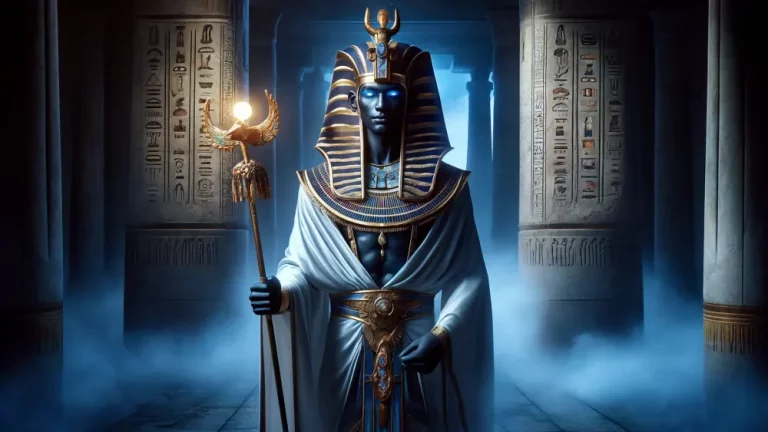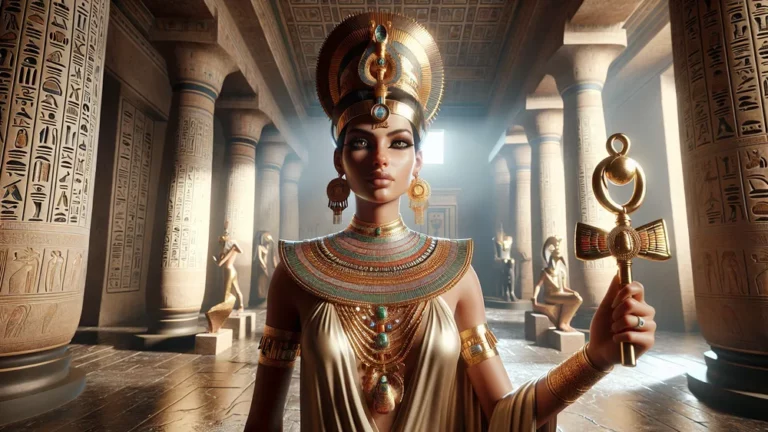Lyssa: Greek Spirit Of Rage And Madness In Mythology
Greek mythology, a collection of stories filled with gods, monsters, and spirits, means a fascinating yet tricky mix of characters and how they get along. Within these captivating figures is Lyssa, the embodiment of anger and craziness, appearing through different mythological stories as a daimon, which is a link between gods and people.
Key Points:
- Lyssa is the Greek spirit of rage and madness, often linked to chaos and revenge.
- She is a daimon, acting as a bridge between gods and humans.
- Seen in myths like Heracles, she causes uncontrollable madness.
- Lyssa’s parentage is varied: Nyx, Gaia, or Aether.
- Rarely directly worshipped but influences rituals on madness.
- Represents raw emotions; feared, yet respected.
- In Greek tragedies, she is a symbol for sudden madness and chaos.
She’s often tied with divine revenge and wildness, and Lyssa’s starts and ways are just as varied as the old cultures that shared Greek myths, making her appear differently across stories and meanings. Think of her kind of like a wild storm or a quieting volcano: natural things that mean the anger and craziness that might hit the minds of gods and people.
When you explore, you’ll find out how Lyssa’s story connects with the larger mythological world, affecting the sad stories of heroes like Heracles and shaping customs and ideas in old Greek culture.
This discussion brings you into a place where Lyssa’s nature not only pushes gods and heroes towards craziness but also mirrors the wild parts of human feelings and actions, ideas that stay meaningful in the never-ending study of mythology.
Lyssa: Overview and Key Facts
| Key Point | Details |
|---|---|
| Name | Lyssa (Lytta is another spelling) |
| Role | Form of mad rage, frenzy, and rabies in creatures |
| Type | Daimon (a spirit between gods and humans) |
| Parentage | Her family line might be from Nyx (Night); other stories say it’s Gaia (Earth) and Aether (Heaven) |
| Cultural Significance | Her reach is seen in different sad stories, meaning the harmful effects of strong emotions on both divine figures and people |
| Symbolism | Means madness, wildness, and mixed-up feelings beyond any calm control |
| Literary Appearances | Seen in Euripides’ work “Heracles,” where she is called to create Heracles’ madness |
| Depictions | She is shown in art and tales as a strong, scary character sometimes with a dark air around, meaning her tie to craziness; many pictures and writings from the past have different ways of seeing her |
| Influence | Her stories connect with ideas of godly anger and people losing their mind, older than similar spirits in other old tales |
| Rituals and Worship | There isn’t a lot of proof of her being directly worshiped, and yet her traits are respected too indirectly through ceremonies linked to madness; some saw her as a power that needed calming or control using rituals that reflect common fears |
Where Did Lyssa Come From in Greek Stories?
Knowing about Lyssa’s mysterious beginnings and the different tales that include her place in Greek mythology is important because we look further into her role, both as a spirit of fury and something that began craziness, in old stories.
Lyssa’s Job as the Spirit of Fury and Insanity
In the large, complicated stories of Greek mythology, Lyssa stands as the example of uncontrolled anger and craziness. She is a strong force meaning people could do things beyond their calm control. A daimon is what she works as, a spirit between gods and people, and her presence means the start of strong emotions much like a sudden storm breaking into calm seas. Her jobs are different and powerful, affecting both humans and gods, and provide a way to explain sudden craziness and disorder. While you look into old tales, you might see Lyssa doing tasks that match chaos and revenge, serving gods who wanted to punish or fix things. Below is a list showing important parts of her job:

- Starter of God-Given Madness: Lyssa often is shown as the force gods use to punish pride or rule-breaking through craziness.
- Sign of Mixed-Up Feelings: She means emotional extremes, leading up to angry outbursts or wild behavior.
- Story Turner: She provides a way to push stories toward tragedy, like in the tale of Heracles where she lets loose uncontrollable madness on him for Hera.
- Show of Respect with Fear: She is among beings who are feared yet respected for their strong power in the divine system.
In Greek mythology, Lyssa is a spirit that brings out sudden, wild emotions and chaos both in humans and gods, often acting as a tool for divine punishment and influencing stories toward tragic events.
Lyssa’s Family Ties and Friends in the Gods’ World
In the family web of Greek stories, Lyssa is often considered the daughter of Nyx, the first goddess of the night. This family line matches her with other hard-to-understand characters in these stories, like Hypnos (Sleep) and Thanatos (Death), brothers who also stand for things beyond what humans can understand.
Some stories say that Lyssa might have been the child of Gaia (Earth) and Aether (Sky), which means the rich mix of overlapping tales within these old tales. Her complex parentage means she is strong and places her among gods tied to raw and basic forces, fitting her place as a power over craziness.
Her family links underline a divine background where lines between light and dark, sane and insane, mix. In these links, Lyssa’s job in madness often leads her to meet other gods and spirits using similar powers of influence, like Hemera – the goddess showing daylight, who is in some tales a direct sister.

This family tie, while not strong in terms of working together, hints at a world where opposing forces such as day and night, clear mind and madness work together to keep everything balanced. Other gods, such as Hera, often used Lyssa’s help to send chaos to certain people or heroes who went against what gods wanted.
Through these partners, Lyssa’s role in stories means a connected web of divine payback and emotional extremes, showing the complicated human feelings as known by old Greek culture. In this web of stories and family ties, Lyssa works both to keep things even and to mess them up, making her important as a natural force within the gods’ group.
Famous Stories and Tales with Lyssa
One of the most important stories with Lyssa in it is in the bad events of Heracles. In this one, the hero, known for his great strength and courage, gets a bad fate from god anger because of Hera’s jealousy, the queen of gods.
Hera, wishing to punish Heracles for being Zeus’s child, who cheated on her, asks Lyssa to make Heracles go crazy. Lyssa’s help makes Heracles do the terrible act of killing his wife and kids in a mad rush. This story means not only Lyssa’s big power to change the human mind but also the theme of god influence found in Greek stories.
Through Heracles’ story, the old Greeks looked at the line between being a hero and being insane, with Lyssa becoming the link that turns good aims into a disaster. Another story with Lyssa’s place is about the old king Proetus of Argos. As per some tales, his daughters were made crazy by Lyssa as a return from Dionysus, the wine and frenzy god, because they didn’t give him honor.
Similar to tales where not respecting gods leads to bad luck, these stories mean the cultural weight of being faithful and showing respect to gods in the old times. When Lyssa puts crazy ideas and wild acts in the Proetides’ heads, the story means social fears of losing control and chaos breaking up ordered community systems.
This highlights the important role of stories in explaining unknown things and keeping social rules. On another side, Lyssa’s steps in myths align her with goddess-like figures who did similar things in myths worldwide.
Though she’s not directly in it, her traits are heard in the story of the Maenads – wild followers of Dionysus – showing a kind seen in many Greek tales that show fear and interest in crazy madness. The idea of big lack of reason connects with figures like the Roman Furor or the Norse Berserkers, showing a common story pattern bigger than Greek tales.
By getting these stories, we can learn how the Greeks saw god punishment and madness and also see how their stories last through different cultures.
What Lyssa Stands For and Why She Matters
Lyssa, in the wide area of Greek stories, means the strong and often scary force of unrestrained emotion. Being the example of madness and anger, she is mixed up with the dramatic parts of human traits. She appears in stories as a sign that tells of rational breakdowns, giving a godly reason for things that people cannot understand, much like a storm that disrupts clear skies suddenly.
This symbolic role fits with how ancient Greeks thought of emotions as outside forces that could grab people beyond their control. By knowing Lyssa’s place, you gain insights into how the Greeks might have seen difficult feelings, viewing them as forces that needed respect. This was also a method for old societies to explain and make sense of irrational actions they saw in people.

Even in art and writing, Lyssa’s traits mean the fear and respect old Greeks felt towards madness and anger, both destroying and interesting. Images usually used for this show her as a wild, mad presence causing wonder and fear. While today, we might use pictures like a roller coaster to convey emotional ups and downs, such images of Lyssa make one recognize the strength and threat of uncontrolled feelings. To understand why she is important, consider these parts of what she stands for:
- Agent of Chaos and Payback: Usually called by other gods to bring revenge through madness.
- Starter for Emotional Release: Her part is highlighted in sad stories where characters get relief or change through big, emotional shake-ups.
- Reflection of Human Vulnerability: Means irrationality, maybe mirroring the unpredictable and uncontrollable bits of the mind.
- Warning Against Proud Acts: Symbols in art often link Lyssa with images that caution against actions of pride inviting godly anger.
How Lyssa Shapes Greek Tragic Plays
After we explore Lyssa’s world of madness and anger, it becomes key to look at how she deeply affects the stories and ideas inside Greek tragic plays.
Lyssa’s Impact on Euripides’ Heracles
In the story “Heracles” by Euripides, Lyssa is not just a side character; she acts as a main part that starts the big trouble. When Hera, queen of the gods, calls on Lyssa, it means a key moment happens, where her power to cause craziness completely changes Heracles’ future. She causes divine madness in him, making Heracles kill his family in a wild fit.
This huge act points to a big idea in the play: the fragile nature of human sanity and how much a god’s actions can change things, which are important thoughts not only in this play but in all Greek tragedy.

She stands for wild anger and is important for how Heracles’ story goes, showing both a personal fight and a common battle against things people cannot control – a theme as current now as it was back then. How Lyssa is shown in “Heracles” is like a strong force in nature hitting the hero, like an unexpected storm messing up a calm sea.
This helps to understand her role – as both certain and unexpected, critical to breaking up people’s plans. Euripides uses Lyssa’s mixture of disorder to look into bigger life ideas seen in Greek tragic stories, like the struggle between what is set in stone and someone’s choices.
Her involvement acts as a plot tool to push Heracles into pain and thinking, maybe reflecting the harsh and sometimes random truths of life and the world. Therefore, Lyssa’s effect goes beyond the characters in the play to form the moral and idea base of the tragedy, asking those who watch and read to think about life’s unpredictable nature.
Comparing Lyssa’s Characters in Other Tragedies
When you look at the different ways Lyssa is shown across Greek tragedies, you see how her character stays the same in theme but changes for different story needs. In “Heracles,” Euripides puts Lyssa right in front as a significant force that starts the hero’s downfall with madness.
This is different from other tragedies where she has a softer role, and just being mentioned can mean different levels of madness and gods getting involved. For instance, in stories where she is called or hinted at, her name alone can drive characters to deadly actions.

This gives her a unique power to be either a worrying threat or a sudden trouble, like a storm that might come or a volcano that could explode when you don’t expect it.
Interestingly, Lyssa acts like an actor taking on various parts in the same kind of story – offering new looks and details while keeping to the main idea of induced madness and confusion. Playwrights might not always name Lyssa straight out, but the ideas she stands for pop up in other tales dealing with subjects like craziness and the gods’ payback.
For example, in “The Bacchae” by Euripides, the craziness Dionysus brings on Pentheus and his followers hints at the chaos Lyssa creates in other stories. Such similarities underline the shared belief Greeks had about madness being because of gods being unhappy and fate being hard to guess.
To make this clearer, here is a table comparing Lyssa’s role in notable Greek tragedies:
| Tragedy | Lyssa’s Role | Influence on Plot |
|---|---|---|
| “Heracles” | Direct starter of madness | Makes Heracles kill his family, acting as a push for tragedy |
| “The Bacchae” | Seen through Dionysian craziness | Points out themes of gods’ payback and disorder |
| Other Tragedies | Sign of possible madness | Acts as unseen threat or clue for irrational acts caused by the gods |
Through these examples, this comparison highlights how Lyssa’s character – though shown in various ways – always stands for a bigger idea of understanding how deities affect human thoughts and actions in Greek tragedy.
Across Greek tragedies, Lyssa serves as a flexible symbol of madness, illustrating how the gods’ influence can drive humans to chaos and irrational actions, despite her role varying from a direct instigator to an unseen threat.
Ties to Worship and Ceremony
After looking at Lyssa’s effect on theater, it is interesting to turn our thoughts to the important ways her essence was part of the rituals and ceremonies in ancient Greek culture.
Worship and Rituals Involving Lyssa
Even though people know Lyssa as a symbol of anger and madness in Greek stories, the exact historical records about her being directly worshipped or part of rituals are still not clear to many and not clearly recorded. Unlike the very well-known gods like Athena or Zeus, Lyssa doesn’t appear to have clear temples or groups devoted just to her.
However, in bigger ceremonies that looked at madness or tried to calm destructive powers, Lyssa’s influence might have meant something symbolic. For example, rituals that aimed to stop madness or protect from wild emotions might involve her in a form of prayers or offerings meant to calm down the chaotic sides of the gods.
This means that while she probably didn’t have a formal spot in rituals, her essence likely stayed in the spiritual mindsets of Greeks, similar to how modern events might symbolically acknowledge challenges to ease their believed effects.
The Role of Madness in Rituals and Symbols
Back in ancient Greece, religious practices had madness closely linked with rituals and symbols. It served as a way to understand and handle the unpredictable forces of nature and gods. Historically, madness was not just seen as being less balanced in the mind but was also considered a key connection to the divine as well as a sign of gods’ displeasure.
Rituals tried to use or calm this madness with symbolic actions and offerings to bring back balance in people’s lives. For instance, in ceremonies for Dionysus, who is known for creating ecstatic states and revelry, madness was part of the divine experience, helping people go beyond normal thinking to connect with the divine but in a controlled way.
This practice means a complex relationship with madness, feared but also respected as a spiritual tool. Additionally, rituals often had elements like those today where emotional challenges are managed through creative activities, much like art therapies using creative methods to deal with emotions. Symbols around madness in Greek rituals did not only show the power of gods.
They were tools for thinking and changing, helping people deal with human limits against divine decisions. Things like masks and wine in Dionysian festivals meant losing control and the line between sanity and ecstasy. They let worshippers explore these ideas in a way that was accepted by the culture.

So, madness in rituals could be seen as a threat, but it was also a path to understanding and connecting with the divine, shaping various religious and cultural activities that reflect deep truths of human existence.
Spirits and Daimones in Greek Mythology
Spirits in Greek stories are often shown as go-betweens between the mortal realm and gods, having a wide range of influences over human life and natural events. These beings, who could be kind or harmful, lived in spaces between the mortal world and what gods want, having control over different parts of life like feelings, health, and fate.
The roles of these spirits are various; some are protectors, giving creativity and wisdom, while others, like Lyssa, mean bad luck or madness. This part of Greek mythology means that ancient Greeks tried to explain the strange and unplanned parts of their world with these mythical figures.
Furthermore, for people interested in these fascinating characters, a full list of Greek Spirits and Daimones gives detailed accounts of their different forms and stories within mythological ideas.
FAQs
1. Who were Lyssa’s parents in Greek mythology?
In Greek mythology, Lyssa’s parents are said to be the primordial deities Nyx (Night) and possibly Erebus (Darkness), although some accounts differ by suggesting she is sprung from the blood of Uranus.
2. What is the symbolic meaning of Lyssa in myth?
The symbolic meaning of Lyssa in myth predominantly represents the embodiment of uncontrolled rage and madness in ancient Greek culture.
3. How is Lyssa depicted in Greek art and literature?
Lyssa is depicted in Greek art and literature as a frenzied and chaotic force personifying irrational rage and madness, often influencing characters to commit acts of violence.
4. Did Lyssa influence other mythologies?
Lyssa’s influence on other mythologies is not explicitly documented, but similar themes of madness and fury can be found in various cultural mythologies, suggesting a pervasive archetypal presence.







